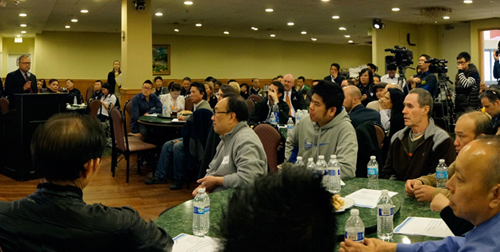By James Tabafunda
Northwest Asian Weekly
Following the “$15 Now” signs carried by demonstrators in downtown Seattle last February, there are new signs on the proposed $15 minimum wage with the words, “SAVE IMMIGRANT JOBS AND SMALL BUSINESSES.”

The New Hong Kong Restaurant was packed with people sharing their concerns with the mayor and the two members of the City Council who showed up. (Photo George Liu/NWAW)
This message brings up a different, no-longer-silent point of view, one shared by many of Seattle’s minority small business owners in and around the International District who have banded together. Known as the Ethnic Community Coalition (ECC), they invited all nine Seattle city council members to an Apr. 23 community forum at the New Hong Kong Restaurant. Two showed up — Sally Clark and Jean Godden.
“All council members are deeply engaged in this discussion,” said Clark. “You don’t see everybody here today, but three of them (Nick Licata, Bruce Harrell, and Kshama Sawant) are actually on the mayor’s (Income Inequality Advisory) committee.”
“We also have Anthony Auriemma from Tom Rasmussen’s office,” moderator Enrique Cerna told the audience of over 150 people.
Godden said she has already discussed the issue with many small business owners. “In my book, this is not a discussion about minimum wage so much as about income equity and opportunity,” she said.
Minority small business owners and other interested citizens brought their most urgent concerns and profit-and-loss statements — in some cases — to the city’s elected officials.
“I’ve been in the restaurant business for 58 years,” said Faye Hong, owner of Hong’s Garden in Renton. “I worked from being a busboy to a business owner.” Hong said raising the minimum wage from $9.32 to $15 an hour would have “a disastrous effect on our community.” While the proposed $15 minimum wage for Seattle would not apply to his restaurant, Hong said if it did, he would close his restaurant within one month.
Hong and other small business owners say the $15 minimum wage represents a higher labor cost that, when paired together with their low profits, can lead to their businesses closing down. Raising the minimum wage to $15 an hour would, they say, have a less harmful effect on large businesses in downtown Seattle with much higher profits.
David Leong, second vice president of the Greater Seattle Chinese Chamber of Commerce, spoke about the $15 minimum wage and local economics. He said, “The world has been in a three-to-five year recession. Has the economy, the GDP gone up 50, 60 percent? I don’t think so.”
“The numbers, in my opinion, don’t really add up, and I think a lot of people will agree with me,” he added. “But, the world is still struggling. The restaurants are struggling down here.”
Clark later said, “We had a noon-time session that was all restaurant-focused about two weeks ago.”
“One of the things we didn’t talk about in that conversation was what else the employer has to do based on the pay scale. That came in some e-mails later on … So, that was really helpful for me to be reminded about the FICA, the Social Security, all of Medicare, all of that that is predicated on what you’re paying.”
After hearing the thoughts of a few more small business owners, Godden mentioned one alternative to the $15 minimum wage. She said, “People are looking at a possible phase-in (of 10 years starting at $10.35 an hour, an ECC proposal) and also there is a possibility that we would separate small businesses from large businesses, so that we would not hurt the small businesses.”
Another ECC proposal is a business and occupation tax credit for small businesses with 75 employees or less.
Godden assured the audience that “we do hear you, and we will do our very best to make sure that you have a survivable business.”
Many small business owners pointed out that the people that would be most affected by the $15 minimum wage would be those with little or no work experience.
Yen Lam, owner of Lam’s Seafood Market, told the city councilmembers, “We’re the ones that employ the immigrants. We’re the ones that employ entry-level (immigrants). We welcome them to our doors. We teach them skills, and they move on to different things, and a lot of them stick with us for 10, 15 years.”
In an April 15 petition entitled “Seattle’s Minimum Wage Increase and the Adverse Affect on Immigrant Communities,” several minority business owners agree with Lam’s point, adding, “…to maximize our bottom line, efficiency, and economy of scale, we will opt to hire the more experienced individuals. If survival of the fittest prevails with this minimum wage increase, where will the unhired go?”
Leong asked the city councilmembers, “What if 50,000 more people decide to go on unemployment? How is that going to benefit the city?”
The Seattle City Council will likely take action on the proposed $15 minimum wage either by the end of May or mid-June, according to Clark.
The ECC is made up of the Greater Seattle Chinese Chamber of Commerce, the Korean American Chamber of Commerce-Washington State, the Greater Seattle Vietnamese Chamber of Commerce, and the King County Hispanic Chamber of Commerce. (end)
For more information about the Ethnic Community Coalition, go to https://www.facebook.com/pages/Ethnic-Community-Coalition/629971780418977.
James Tabafunda can be reached at info@nwasianweekly.com.

